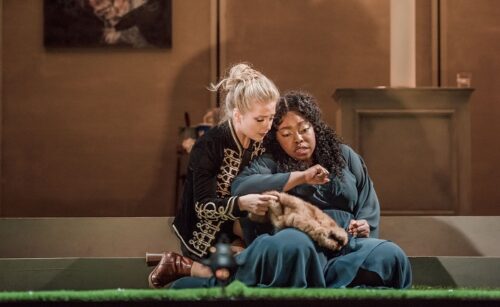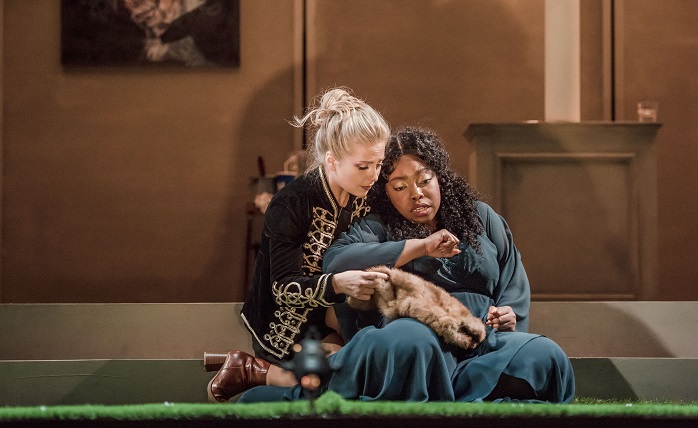 United Kingdom Nevill Holt Opera 2022 [1] – Puccini, La bohème: Soloists, Manchester Camerata / Nicholas Chalmers (conductor). Market Harborough, Leicestershire. 8.6.2022. (CP)
United Kingdom Nevill Holt Opera 2022 [1] – Puccini, La bohème: Soloists, Manchester Camerata / Nicholas Chalmers (conductor). Market Harborough, Leicestershire. 8.6.2022. (CP)

Production:
Director – Mathilda du Tillieul McNicol
Designer – Basia Bińkowska
Lighting designer – Jack Knowles
Movement director – Sacha Plaige
Cast
Rodolfo – Peter Scott Drackley
Mimì – Francesca Chiejina
Musetta – Alexandra Oomens
Marcello – Christopher Nairne
Schaunard – Dominic Sedgwick
Colline – Dingle Yandell
Benoît/Alcindoro – Andrew Tipple
Parpignol – Cameron Mitchell
Never fearful of creative adventures, Nevill Holt Opera’s La bohème transforms Puccini’s desired bohemian lodgings within an attic above the rooftops in Paris into the modern-day garden office adopted by so many across the country in the new post-pandemic way of working. No such adventures in the pit, where all remains constant with Nevill Holt Opera’s Artistic Director and Conductor, Nicholas Chalmers, leading the outstandingly efficient Manchester Camerata through the bundle of tricks and delightful irrelevant orchestral garrulities which are a signature of Puccini’s operas. His music provides the perfect backdrop for the blubbering and whispering pity which Mimì (Francesca Chiejina) deserves as she seeks help from the four impoverished bohemians in that attic room, now garden room. Those four are Rodolfo the poet (Peter Scott Drackley), Marcello the painter (Christopher Nairne), Schaunard the musician (Dominic Sedgwick), and Colline the philosopher (Dingle Yandell) – a quartet which is an important part of a super-strong cast. After an absence of three years NHO are back in their award-winning auditorium; the garden room set requiring just one significant scene change as the action returns from the outskirts of Paris to the attic for the last act.
Francesca Chiejina is the busiest of Mimìs. Her 16-performance tour as Mimì with English Touring Opera finished last week, with performances in Bath and Ulverston; she has moved seamlessly into her five performances with NHO – an astonishing work-rate for a young artist. Being heard above Chalmers and his Manchester Camerata is some achievement. Her voice has apparently grown during those few days of rehearsal between her performances in Bath and Market Harborough. At no time did the orchestra threaten to overwhelm her.
Last year, Director Mathilda du Tillieul McNicol, worked as assistant to Jamie Manton on their very innovative outdoor interpretation of La traviata involving an 18 metre dome, a frequently recognised feature at the Glastonburys of this world. This year she has great success in recreating the disorder of bohemian life in Paris in the early part of the 1800s with clever touches reminding her audience of the importance of Henri Murger’s 1849 novel Scènes de la vie de bohème and the reproduction of the painting, The Passage of the Red Sea. Marcello who claims he can feel the Red Sea running down his back, unforgivingly fails to complete the painting, whilst showing some of the personality traits of painter, François Tabar, who spoke often of his intention to paint the passage of the Hebrews through the Red Sea. McNicol and her designer, Basia Bińkowska, manage to create an image of the day to day struggles of bohemians – lack of heating, lack of food – and at one point Marcello seizes a chair to break up to put in the stove to provide some heating. In the nick of time, Rodolfo offers to use parts of his latest manuscript to keep the fire going.
Warmth and encouragement for the bohemians comes in the form of a spirited and enthusiastic children’s chorus, drawn from Bringhurst Primary School and Lodge Park Academy, two parts of the David Ross Education Trust. If anyone worries about how and from where the next generation of artists will emerge, here is a working answer in practice. In tandem with the Trust, the Ross Foundation awards grants to organisations offering access to the arts. Movement director Sacha Plaige deserves plaudits for her efforts with the children and, in particular, her work with the pompous Parpignol (Cameron Mitchell), the toy vendor dressed as the black bear. Lighting designer Jack Knowles chooses to light the attic/garden room as a fun fair attraction with a string of lights surrounding the structure; much more worrying is the lack of insulation those flimsy sliding glazed doors offer; no wonder those bohemians are freezing cold!

Productions of La bohème can be ridiculously romantic, sometimes over dramatic and frequently too tragic for words. Not so with NHO! Romance, jealousy and tragedy are in abundance but not over-abundance. Chiejina’s strong voice is equally matched by that of tenor, Drackley. There is some romance, there is a little fondness, there is flirtatiousness – all kept under control, with the exception of Alexandra Oomens (Musetta) who gives a model illustration of how to handle the nineteenth century state councillor or today’s ‘sugar daddy’. She brightened the second act with a shameless piece of exhibitionism caused by her ill-fitting shoes, before falling into the arms of Marcello.
Manchester Camerata delivered a typical fiery start to Act III, with four horns excelling, supported by some fine double bass involvement. For selfish reasons, Rodolfo avoids Mimì due to her ill health; however, Marcello’s intervention brings them back together as Puccini’s minor dissonant score takes prominence throughout those tentative reunions. Puccini’s tear-jerking closing bars as Mimì fades away enables conductor Chalmers to bring the very best from his charges with a tumultuous close.
Clive Peacock
